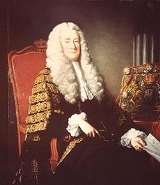
The Charitable Corporation v. Sutton
Encyclopedia
The Charitable Corporation v Sutton (1742) 26 ER 642 is an important old English law
case which holds in substance that a director of a company owes duties to the company in the same measure and quality as does a trustee to a trust. It makes the point that judges should not be quick to judge decisions of directors with hindsight.
was a company set up by Royal Charter, to give loans of money to poor people, to prevent them falling into the hands of pawnbrokers. The directors (or committee-men as they were called at the time) were accused of failing to properly monitor the procedures for loans by the corporation. It had suffered a loss of around £350,000. A warehouse keeper was responsible for giving unsecured loans to fellow directors. Only five directors were actively involved in the corporation's affairs. It was alleged that the failure of the remaining forty five directors were guilty of gross negligence
.
English law
English law is the legal system of England and Wales, and is the basis of common law legal systems used in most Commonwealth countries and the United States except Louisiana...
case which holds in substance that a director of a company owes duties to the company in the same measure and quality as does a trustee to a trust. It makes the point that judges should not be quick to judge decisions of directors with hindsight.
Facts
The Charitable CorporationCharitable Corporation
The Charitable Corporation was an institution in Britain intended to provide loans at low interest to the deserving poor, including by large-scale pawnbroking. It was established by charter in 1707. Its full title was "Charitable Corporation for the relief of the industrious poor by assisting them...
was a company set up by Royal Charter, to give loans of money to poor people, to prevent them falling into the hands of pawnbrokers. The directors (or committee-men as they were called at the time) were accused of failing to properly monitor the procedures for loans by the corporation. It had suffered a loss of around £350,000. A warehouse keeper was responsible for giving unsecured loans to fellow directors. Only five directors were actively involved in the corporation's affairs. It was alleged that the failure of the remaining forty five directors were guilty of gross negligence
Gross negligence
Gross negligence is a legal concept which means serious carelessness. Negligence is the opposite of diligence, or being careful. The standard of ordinary negligence is what conduct one expects from the proverbial "reasonable person"...
.

